|
This
film is quite simply a masterpiece. The musical score and opening
sequences set the mood immediately. The cast could not have been
better chosen - each carries off their part with absolute believability.
The first action scene is brilliant, also telling the audience that
they're in for a good ride. Russell Crowe is Maximus, his
adversary Joaquin Phoenix, Commodus.
A great goodie and a great baddie. Stunning locations and scenery
add to the occasion, a recreation of the Roman Empire at time of
change. The direction and acting is flawless, from the main
characters and supporting cast. For this reason the epic film is my
favorite* and is bound to become an all time classic.
PLOT
SUMMARY
In
the final days of Marcus Aurelius' reign, the aging emperor angers his
son Commodus by making it known that he wants Maximus, a fearsome and
respected Roman general, to be his successor. Maximus is a
powerful Roman general, loved by the people and the aging Emperor,
Marcus Aurelius. Before his death, the Emperor chooses Maximus to be his
heir over his own son, Commodus, and a power struggle leaves Maximus and
his family condemned to death.
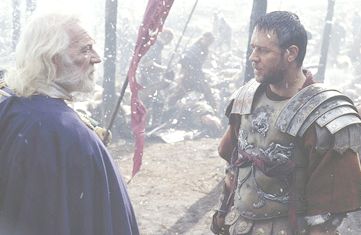
Power-hungry
Commodus kills his father and orders the death of Maximus. But the
latter flees, only to discover that his wife and child have been
murdered by Commodus. The powerful
general is unable to save his family, and his loss of will allows him to
get captured and put into the Gladiator games until he dies.
Captured,
Maximus is forced into slavery, where he is sold to Proximo, a former
gladiator who serves as both mentor and slavemaster. Maximus trains as a
gladiator in the arena, where his fame grows. He goes to Rome, intent on
avenging the murder of his wife and son by killing the new emperor
Commodus.
Maximus
has learned that the one power stronger than that of the emperor is the
will of the people, and he knows he can only attain his revenge by
becoming the greatest hero in all the empire. The greatest
champion of Rome is brought out of retirement in an attempt to kill
Maximus. Tigers held in position with rope and a great fighter await
Maximus in the great Colliseum of Rome. Maximus ultimately continues on
his quest to fulfill the wishes the previous emperer has asked of him.
The
only desire that fuels him now is the chance to rise to the top so that
he will be able to look into the eyes of the man who will feel his
revenge. The movie ends with Maximus taking a new name,
"General." The Emperer Commodus then attempts to take Maximus
out of the picture. The Emperer meets Maximus in the arena and meets him
with sword himself. The future of Rome is determined.
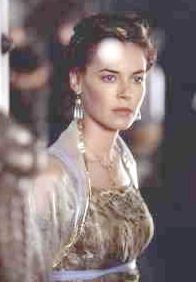
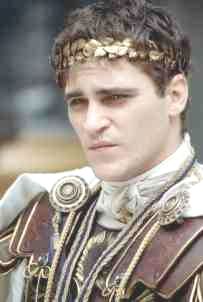
Tagline:
What We Do In Life Echoes In Eternity.
| Also
Known As: |
Gladiators
|
|
|
| Production
Status: |
Released |
|
|
| Logline: |
When
a Roman general is betrayed and his family murdered by a
corrupt prince, he comes to Rome as a gladiator to seek
revenge. |
|
|
| Genres: |
Action/Adventure
and Drama |
|
|
| Running
Time: |
2
hrs. 30 min. |
|
|
| Release
Date: |
May
5, 2000 Nationwide |
|
|
| MPAA
Rating: |
R for
intense graphic combat. |
|
|
| Distributors: |
DreamWorks SKG
|
|
|
| Production
Co.: |
Red Wagon Entertainment, Scott
Free Productions
|
|
|
| Studios: |
DreamWorks SKG, Universal
Pictures
|
|
|
| U.S.
Box Office: |
$187,670,866 |
|
|
| Filming
Locations: |
Ouarzazate, Morocco, Malta,
Shepperton Studios, England, United Kingdom Farnham,
England, Italy
|
|
|
| Produced
in: |
United
States |
Gladiator
is the product of the carefully choreographed sword fights (by Nicholas
Powell, who also choreographed Braveheart's sword fight scenes); of
magnificent set design, especially the reconstruction of the Coliseum
(by production designer Arthur Max); accurate costume designs (by Janty
Yates); and weaponry design (by supervising armorer Simon Atherton). Gladiator
captures most of its glory in the heroism of its main character Maximus,
the General/Gladiator. The character's strength and appeal derives from
a well-developed role and from Crowe's accurate personification and
skillful performance.
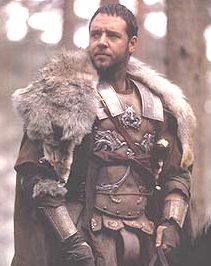
Once
again, Director Ridley Scott proves to be as professional as one can be.
The recreation of ancient Rome is splendid, with all its magnificent
buildings and atmosphere and he is able to show with all brightness the
greatness of the Roman Empire, with its political problems and military
discipline, and love and treason, of hate and jealousy, that still have
a place in our world today. But the story has a glow of its own, to
which all the beautiful scenery (believe me, it's awesome!!!) and great
cinematography are just balancing factors. The plot is a rich one, that
is as dynamic as it is present. He once again, after Blade Runner, 1492,
and others helps us visit the depths of the human soul, which remains
the same over all our historical and social experience. Even the fights,
are displayed in such a way that all the blood is quite discrete, but
still, making us feel like screaming and jumping out of our seats. I
would also like to point out the performances of the cast, that is
surprisingly good. We have some actors and actresses, who are not
Hollywood icons, but are are greatly able to move the audience among
screams and tears. All in all, we have guys like Russel Crowe, who are
coming out to be part of a new and extremely promising harvest of people
who are making each time more fans around the world. Well, you should
see for yourself!
CAST
Russell Crowe as Maximus Decimus Meridius: A Hispano-Roman legatus forced into becoming a slave who seeks revenge against Commodus. He has earned the favor of Marcus Aurelius, and the love and admiration of Lucilla prior to the events of the film. His home is near Trujillo in today's Province of Cáceres, Spain. After the murder of his family he vows vengeance.
Joaquin Phoenix as Commodus: The amoral, power-hungry, embittered son of Marcus Aurelius. He murders his father when he learns that Maximus will hold the emperor's powers in trust until a new republic can be formed.
Connie Nielsen as Lucilla: Maximus's former lover and the older child of Marcus Aurelius. Lucilla has been recently widowed. She resists her brother's incestuous advances, while protecting her son, Lucius, from her brother's corruption and wrath.
Oliver Reed as Antonius Proximo: An old, gruff gladiator trainer who buys Maximus in North Africa. A former gladiator himself, he was freed by Marcus Aurelius and becomes a mentor to both Maximus and Juba. This was Reed's final film appearance, as he died during the filming. In the original film script, Proximo was supposed to live. Richard Harris, who was later cast as Marcus Aurelius, was considered for the part.
Derek Jacobi as Senator Gracchus: A member of the Roman Senate who opposes Commodus's rule and an ally of Lucilla and Maximus. In the original film script, Gracchus was supposed to die.
Djimon Hounsou as Juba: A Numidian tribesman who was taken from his home and family by slave traders. He becomes Maximus's closest ally and friend, and inspires Maximus to bring down Commodus for the greater good before he joins his family in the afterlife.
Richard Harris as Marcus Aurelius: The old and wise emperor of Rome who appoints Maximus, whom he loves as a son, to be his successor, with the ultimate aim of returning Rome to a republican form of government. He is murdered by his son Commodus before his wish can be fulfilled.
Ralf Möller as Hagen: A Germanic warrior and Proximo's chief gladiator who later befriends Maximus and Juba during their battles in Rome. He is killed by the Praetorian Guard during Maximus's attempted escape from Rome.
Tommy Flanagan as Cicero: Maximus's loyal servant who provides liaison between the enslaved Maximus, his former legion based at Ostia, and Lucilla. He is used as bait for the escaping Maximus and eventually killed by the Praetorian Guard.
David Schofield as Senator Falco: A patrician, a senator opposed to Gracchus. He helps Commodus to consolidate his power.
John Shrapnel as Senator Gaius: A Roman senator allied with Gracchus, Lucilla, and Maximus against
Commodus.
Tomas Arana as General Quintus: A Roman legatus, commander of the Praetorian Guard, who betrays Maximus by allying with Commodus. In the extended version, Quintus sees the mad side of Commodus when he is forced to execute two innocent men. Quintus later redeems himself by refusing to allow Commodus a second sword during the latter's duel with Maximus, and promises to honor Maximus's last wishes.
Spencer Treat Clark as Lucius Verus: The young son of Lucilla. He is named after his father Lucius Verus, who was co-emperor until AD 169. He is also the grandson of Marcus Aurelius. He idolizes Maximus for his victories in the arena.
David Hemmings as Cassius: The master of ceremonies for the gladiatorial games in the
Colosseum.
Sven-Ole Thorsen as Tigris of Gaul. The only undefeated Gladiator, was brought out of retirement by Commodus to kill Maximus.
Omid Djalili as a slave trader.
Giannina Facio as Maximus's wife.
Giorgio Cantarini as Maximus's son, who is the same age as Lucilla's son
Lucius.
Adam Levy as Condemned Officer.
DEVELOPMENT & PRODUCTION
Gladiator was based on an original pitch by David Franzoni, who wrote the first draft. Franzoni was given a three-picture deal with DreamWorks as writer and co-producer on the strength of his previous work, Steven Spielberg's Amistad, which helped establish the reputation of DreamWorks. Franzoni was inspired by Daniel P. Mannix's 1958 novel Those About to Die, and he chose to base his story on Commodus after reading the ancient Roman Historia Augusta. In Franzoni's first draft, dated April 4, 1998, he named his protagonist Narcissus, a wrestler who, according to the ancient sources Herodian and Cassius Dio, strangled Emperor Commodus to death.
Ridley Scott was approached by producers Walter F. Parkes and Douglas Wick. They showed him a copy of Jean-Léon Gérôme's 1872 painting entitled Pollice Verso (Thumbs Down). Scott was enticed by filming the world of Ancient Rome. However, Scott felt Franzoni's dialogue was too "on the nose" (lacking subtlety) and hired John Logan to rewrite the script to his liking. Logan rewrote much of the first act and made the decision to kill off Maximus's family to increase the character's motivation. Russell Crowe describes being eager for the role as pitched by Parkes, in his interview for Inside the Actors Studio: "They said, 'It's a 100-million-dollar film. You're being directed by
Ridley Scott. You play a Roman General.' I've always been a big fan of Ridley's."
With two weeks to go before filming, the actors complained of problems with the script. William Nicholson was brought to Shepperton Studios to make Maximus a more sensitive character. Nicholson reworked Maximus' friendship with Juba and developed the afterlife thread in the film, saying, "he did not want to see a film about a man who wanted to kill somebody." The screenplay faced many rewrites and revisions, with several actors providing changes. Crowe questioned every aspect of the evolving script and strode off the set when he did not get answers. According to a DreamWorks executive, Crowe "tried to rewrite the entire script on the spot. You know the big line in the trailer, 'In this life or the next, I will have my vengeance'? At first he absolutely refused to say it."
Crowe described the script situation: "I read the script and it was substantially underdone. Even the character didn't exist on the pages. And that set about a long process, that's probably the first time that I've been in a situation where the script wasn't a complete done deal. We actually started shooting with about 32 pages and went through them in the first couple of weeks." Of the writing and filming process, Crowe added, "Possibly, a lot of the stuff that I have to deal with now in terms of my 'volatility' has to do with that experience. Here was a situation where we got to Morocco with a crew of 200 and a cast of a 100 or whatever, and I didn't have anything to learn. I actually didn't know what the scenes were gonna be. We had, I think, one American writer working on it, one English writer working on it, and of course a group of producers who were also adding their ideas, and then Ridley himself; and then, on the occasion where Ridley would say, 'Look, this is the structure for it – what are you gonna say in that?' So then I'd be doing my own stuff, as well. And this is how things like, 'Strength and honor,' came up. This is how things like, 'At my signal, unleash hell,' came up. The name Maximus Decimus Meridius, it just flowed well."
Maximus' habit of rubbing soil before each fight references the attachment and affection to his former life as a farmer. In a conversation with Marcus Aurelius, Maximus says the fecund soil of his farm is "black like my wife's hair". Crowe wrote the speech himself, drawing on his feelings of homesickness for his own farm.
In preparation for filming, Scott spent several months developing storyboards to develop the framework of the plot. Over six weeks, production members scouted various locations within the extent of the Roman Empire before its collapse, including Italy, France, North Africa, and England. All of the film's props, sets, and costumes were manufactured by crew members due to high costs and unavailability of the items.
FILMING
The film was shot in three main locations between January and May 1999. The opening battle scenes in the forests of Germania were shot in three weeks in the Bourne Woods, near Farnham, Surrey, in England. When Scott learned that the Forestry Commission planned to remove a section of the forest, he persuaded them to allow the battle scene to be shot there and burn it down. Scott and cinematographer John Mathieson used multiple cameras filming at various frame rates and a 45-degree shutter, creating stop motion effects in the action sequences, similar to techniques used for the battle sequences of Saving Private Ryan (1998). Subsequently, the scenes of slavery, desert travel, and gladiatorial training school were shot in Ouarzazate, Morocco, just south of the Atlas Mountains over a further three weeks. To construct the arena where Maximus has his first fights, the crew used basic materials and local building techniques to manufacture the 30,000-seat mud brick arena. Finally, the scenes of Ancient Rome were shot over a period of nineteen weeks in Fort Ricasoli, Malta.
In Malta, a replica of about one-third of Rome's Colosseum was built, to a height of 52 feet (15.8 meters), mostly from plaster and plywood (the other two-thirds and remaining height were added digitally). The replica took several months to build and cost an estimated $1 million. The reverse side of the complex supplied a rich assortment of Ancient Roman street furniture, colonnades, gates, statuary, and marketplaces for other filming requirements. The complex was serviced by tented "costume villages" that had changing rooms, storage, armorers, and other facilities. The rest of the Colosseum was created in computer-generated imagery using set-design blueprints and textures referenced from live action, and rendered in three layers to provide lighting flexibility for compositing in Flame and Inferno software.
HISTORICAL ACCURACY
The film is loosely based on real events that occurred within the Roman Empire in the latter half of the 2nd century AD. As Ridley Scott wanted to portray Roman culture more accurately than in any previous film, he hired several historians as advisors. Nevertheless, some deviations from historical fact were made to increase interest, maintain narrative continuity, and for practical or safety reasons. Scott also stated that due to the influence of previous films affecting the public perception of what ancient Rome was like, some historical facts were "too unbelievable" to include. For instance, in an early version of the script, gladiators would have been carrying out product endorsements in the arena; while this would have been historically accurate, it was not filmed for fear that audiences would think it anachronistic.
At least one historical advisor resigned due to these changes. Another asked not to be mentioned in the credits (though it was stated in the director's commentary that he constantly asked, "where is the proof that certain things were exactly like they say?"). Historian Allen Ward of the University of Connecticut believed that historical accuracy would not have made Gladiator less interesting or exciting, stating, "creative artists need to be granted some poetic license, but that should not be a permit for the wholesale disregard of facts in historical fiction".
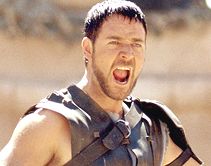

GLADIATOR
TRIVIA:
-
Like
modern day athletes, ancient Roman gladiators did product
endorsements. The producers considered including this in the script
but discarded the idea as unbelievable.
-
Russell
Crowe began shooting for Gladiator a few months after The
Insider (1999) wrapped. He had gained upwards of 40 pounds for
his Oscar-nominated role in The Insider and yet lost it all before
Gladiator began. He claims he did nothing special other than normal
work on his farm in Australia.
-
Lou
Ferrigno was originally cast as Tigris of Gaul, but was replaced
during production by Sven-Ole
Thorsen who had been lobbying hard for the part.
-
Oliver
Reed suffered a fatal heart attack during filming. Some of his
sequences had to be re-edited and a double, photographed in the
shadows and with a 3D CGI mask of Reed's face, was used as a
stand-in. The film is dedicated to his memory.
-
Connie
Nielsen found the 2000-year-old signet ring which she wears in
the movie, in an antique store.
-
In
the Colosseum scenes, only the bottom two decks are actually filled
with people. The other thousands of people are computer-animated.
-
Among
the chanting of the Germanic hordes at the beginning of the film are
samples of the Zulu war chant from the film Zulu
(1964).
-
In
the Spanish dubbed version Maximus says he is from Emerita Augusta
(now called Merida). The Spanish dubbers claimed that,
"Trujillo doesn't combine the 'qualities' to be cradle of the
gladiator."
-
The
wounds on Russell
Crowe's face after the opening battle scene are real, caused
when his horse startled and backed him into tree branches. The
stitches in his cheek are clearly visible when he is telling
Commodus he intends to return home.
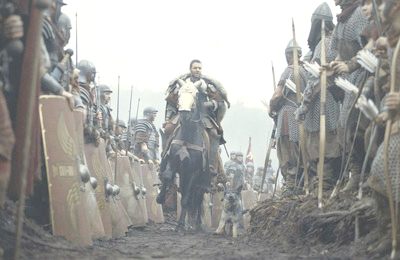
-
Maximus'
('Russell Crowe' ) description of his home (specifically how the
kitchen is arranged and smells in the morning and at night) was
ad-libbed - it's a description of Crowe's own home in Australia.
-
Character
actor Sven-Ole Thorsen
not only played Tigris the Gaul but doubled as one of the spectators
during that same battle.
-
The
yak helmet worn by the gladiator who was slain by Hagen, is the same
one worn by the warrior slain by Sean
Connery, in Time
Bandits (1981).
-
Some
of the battle music on the soundtrack interpolates variations on
"Mars, the Bringer of War" from Gustav
Holst's "The Planets".
-
During
filming, director Ridley
Scott wore the red cap worn by Gene
Hackman in the movie Crimson
Tide (1995), which was directed by Ridley's brother, Tony
Scott.
-
Richard
Harris, who plays Marcus Aurelius, was originally set to play
Commodus in The Fall
of the Roman Empire (1964) (but left the film due to artistic
differences with director Anthony
Mann and was replaced by Christopher
Plummer).
-
At
one point, Commodus mentions the emperor Claudius to Lucilla and
Lucuis. Derek Jacobi,
who plays Gracchus in this film, played Claudius in the BBC TV
series "I,
Claudius" (1976) (mini).
-
The
real-life Commodus was in fact the only Roman Emperor in history to
fight as a gladiator in the arena. However, he did it several times,
not just once. Also, he was not killed in the arena but was
strangled in his dressing room by an athlete named Narcissus.
-
Although
much of the movie is fictitious, it's interesting to note that
emperor Commodus' historically accurate killer, Narcissus, was born
in the same Roman African province as the one in the movie where
Maximus becomes a gladiator.
-
In
the original drafts of the script, the name of the main character
was not "Maximus" but "Narcissus" the name of
the man who killed Commodus in real life.
-
Mel
Gibson was offered, but turned down the part of Maximus.
-
Contrary
to rumor, Enya
didn't record any music for the soundtrack of this film. The song
simply sounds like something she would have recorded. The song, and
in fact much of the soundtrack, was composed and sung by Lisa
Gerrard.
-
Writer
David Franzoni
started developing the story in the 1970s when he read "Those
Who Are About To Die," a history of the Roman games by Daniel
P. Mannix; Franzoni later discussed the idea with 'Steven
Spielberg' during their work on Amistad
(1997), saying that he envisioned Commodus as being something like Ted
Turner in the way he combined politics and entertainment to
establish a base of influence.
-
Ridley
Scott was persuaded to do the film when DreamWorks head Walter
F. Parkes and producer Douglas
Wick presented him with a reproduction of the 1872 painting
"Pollice Verso" ("Thumbs Down") by Jean-Leon
Gerome, in which a gladiator stands over the opponent he has beaten.
-
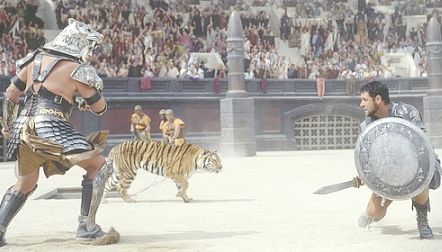
-
On
visiting the real Colosseum, Ridley
Scott remarked to production designer 'Arthur Max' that it was
"too small," so they designed an outsized "Rome of
the imagination" which was inspired by English and French
romantic painters, as well as Nazi architect Albert
Speer.
-
Writer
William Nicholson
added the aspects of the film in which Maximus discusses the
afterlife, seeking to make the character more accessible to
audiences.
-
Over
the course of the gladiatorial scenes, Russell
Crowe broke bones in his foot and his hip, and injured both
bicep tendons.
-
Writer
David Franzoni
chose not to use the end of the film to note that Rome did not, in
fact, become a republic again, because he thought most audiences
would already know that.
-
Among
the changes necessitated by the death of Oliver
Reed was the final scene, as it was supposed to have been
Proximo who buried the figures in the sand of the Coliseum.
-
Editor
Pietro Scalia
added the shot of Maximus moving through a wheat field to the
beginning of the film; it had been filmed for the ending.
-
Some
shots of Oliver Reed had to be faked with CGI after his death, at an estimated cost of $3
million.
-
Maximus'
Spanish heritage meshes interestingly with his choice of arms - as a
General riding with the cavalry of the Felix Legion, (in the opening
battle) he wields a sword known as a "Spatha", popular
among the continental tribes especially in Spain and southern Gaul.
As a Gladiator, he uses a sword similar to the spatha in appearance
but shorter and broader. This weapon is known as the "Gladius
Hispaniensis", and was adopted by the Roman infantry after
Scipio's invasion of the Iberian Peninsula in the II century B.C.,
after the end of the 2nd Punic War. Roman infantry wore the gladius
on the right side - this, facilitated by the short blade length,
allowed the legionary to draw his weapon on the same side as his
sword arm; cross-drawing would be hindered by the scutum (the large
rectangular shield) while in formation.
-
The
short sword used by the Roman army, the Galdius Hispaniensis, is
seen being used by many gladiators in the film. The version used in
the arena in the film is accurate as depicted; it was often shorter
than the military version. The use of the gladius is actually the
source of the word "Gladiator".
-
Various
historians have tried to find proof that the awning in the Coliseum
really was used as a cooling system.
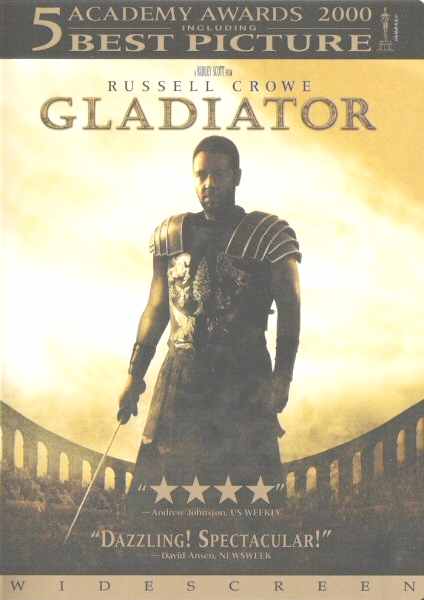
|
In
this epic of a movie. a man robbed of his family, name and
dignity strives to win them back and gain revenge on the evil
Emperor of Rome.
An
epic historical drama from director Ridley Scott, set in the
year 180, begins with the death of emperor Marcus Aurelius
(Richard Harris) which throws the Roman Empire into chaos.
Maximus
(Russell Crowe) is one of the Roman army's most capable and
trusted generals and a key advisor to the emperor. As Marcus'
devious son Commodus (Joaquin Phoenix) ascends to the throne,
Maximus is condemned to be executed to perfect the deception.
But
Maximus escapes from his executioners in a brilliant frosty
morning wood scenario, is subsequently captured by slave
traders, renamed Spaniard and forced to become a gladiator by
Proximo (Oliver Reed - who died of a heart attack midway
through production).
Maximus
battles to the death with other men for the amusement of
paying audiences. His battle skills serving him well. He
becomes one of the most famous and admired men to fight in the
Coliseum. Determined to avenge himself against the evil
Emperor Commodus, who took away his freedom and laid waste to
his family. Maximus learns that he can use his fame and
skill in the ring to avenge the loss of his family and former
glory.
As
the gladiator begins to challenge his rule, Commodus decides
to put his own fighting mettle to the test by squaring off
with Maximus in a battle to the death, having first fatally
wounding Maximus while he is helplessly bound.
Gladiator
also features Derek Jacobi, Connie Nielsen, Djimon Hounsou.
|
*
Please note: The listing order of films is subject to review and
comparrisson with other films, and is the personal opinion of our
reviewers, not the opinion of any film company or broadcasting
organisation.
A
- Z FILMS INDEX
A
- Z ACTORS INDEX

-
|








